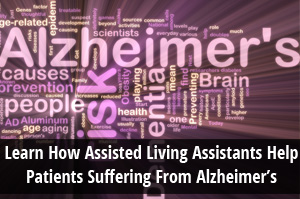
03 Jul Learn How Assisted Living Care At Home Help Patients Suffering From Alzheimer’s
Alzheimer’s is a chronic and progressive disease that leaves its victims completely dependent upon others for help with nearly all of their day-to-day tasks. According to the Alzheimer’s Association, the world’s leading voluntary organization in Alzheimer’s care, support, and research, over 5 million people in the United States are currently affected by the disease. In fact, one in nine Americans over the age of 65 (a whopping 11 percent) has Alzheimer’s.
Most of the time the care and support of Alzheimer’s victims falls on their immediate family members. Indeed, the Alzheimer’s Association claims that 10 million American’s struggle to provide their loved ones with the care they require. The mental and physical burden of caring for a family member struggling with Alzheimer’s can often lead to problems with anxiety and depression.
This is exactly where assisted living comes into play. These programs are specifically designed to provide care and support to Alzheimer’s patients while giving family members a much needed break. The specialists in charge of providing this type of care are known as assisted living caregivers or assistants. Below is a little more information on what assisted living is and the type of care that assisted living caregivers can provide to those suffering from Alzheimer’s disease.
So What Exactly Is Assisted Living Care?
Though they are often grouped in the same category, assisted living is quite a bit different from other types of elderly care such as nursing homes. However, assisted living care itself comes in a number of different forms. The two main ones for those with Alzheimer’s include Assisted Living Facilities and Assisted Living Home Care.
Assisted living facilities are group senior living communities that provide a healthy and safe environment for seniors to live at. Many provide apartment-style rooms for their members to live in. Caregivers are on-site 24/7 to take care of any needs a patient may have. They help your loved ones with such daily tasks as cooking, cleaning, bathing, dressing, and undressing. Medical support, social opportunities, and dining are also generally offered onsite.
Assisted living facility offer varying degrees of service and support for your loved one with Alzheimer’s depending on the need. Some facilities provide limited assistance while others offer comprehensive care. For this reason, it is very important to do your research on (and hopefully visit in-person) an assisted living facility before making a final decision on it.
The other primary type of assisted living care is Assisted Living Home Care. This is becoming increasingly popular for those with Alzheimer’s. Instead of living on-site in a care facility, the patient continues to live at home. Caregivers visit on a regular basis while the family members are at work or otherwise need time off from giving care. Precision Home Health Care provides a customized solution for each client that is suitable for their in-home needs. Call us for a free consultation.
Our caregivers help prepare meals and monitor diets, run errands and do shopping, and provide joyful companionship among many other services. This is a great choice for seniors with Alzheimer’s that are still able to remain at home yet still need regular care.
How Do I Know My Assisted Living Caregiver Specializes in Alzheimer’s
When it comes to the care of an aging family member, you only want the best. Those seeking assisted living for their family members need to make sure that the caregiver in question is trained to work with those with Alzheimer’s disease.
The best way to know if a caregiver specializes in Alzheimer’s care and support is to ask. Reliable assisted living assistants will be more than happy to provide you with the information you are looking for. Many of these caregivers are specially accredited to work with Alzheimer’s and Dementia patients.
A Quick Note About Advanced Alzheimer’s
It is important to note that most assisted living facilities and assisted living home care only provide support to those in the early stages of Alzheimer’s. Since the disease is progressive and symptoms worsen over time, at some point you are likely going to need to consider moving your loved one to a nursing home or special memory care facility.
What Is Right For You?
The most effective way to select the best care for your loved one with Alzheimer’s is to take their individual needs and preferences into question. The type of assisted living care and support they receive should depend on the stage of Alzheimer’s they are suffering from. Their doctor, as well as their assisted living caregiver, will help you make the right decision for you.




No Comments